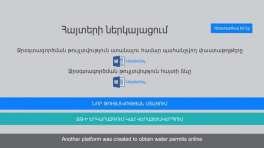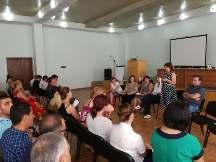
19 minute read
RESULT AREA 1: POLICY AND REGULATORY IMPROVEMENTS TO FOSTER PARTICIPATORY USE OF WATER ARE IN PLACE
RA Minister of Environment, around 100 stakeholders from central, local, governments, local and international organizations, experts as well as representatives from the private sector and media attended the launch. A ceremony to sign memorandums of cooperation between partner communities and the PURE Water project concluded the event (Annexes General: 2-13).
The Project Launch and Signing Memoranda of Cooperation between Partner Communities and the Project
Advertisement
1.1․ Gaps in the policy-regulatory environment identified, a strategy for policy regulatory improvements and a road map for improved water resource management developed and agreed upon amongst stakeholders
Pre-project situation: Despite ongoing improvement of legislation in the water sector, (a National Water Policy, National Water Program, RA Water Code, etc.), before the start of the project, all stakeholders recognized the need for further improvement of a legal and regulatory framework. It included the legislative gaps to foster participatory management and use of water resources which was the main focus of the project. The absence of well-developed culture by decision-makers to initiate a multi-stakeholder discussion, the lack of strategic approach, and a clear roadmap hindered the development of comprehensive legislation to facilitate actions towards efficient management and use of groundwater resources in Ararat Valley.
The USAID PURE Water project assisted the Armenian Government by contributing to a participatory and strategic approach to legislative changes to facilitate the participatory management of groundwater resources.
Achievements
A sound basis for the GOAM is in place for comprehensive policy and regulatory improvement to foster participatory use and efficient management of water
5 legal documents have been drafted:
Assessment of Policy and Regulatory Framework of Water Resources Management and Elaboration of Ways for
Improvement” (Legal Assessment) (Annex RA 1-10)
Water Resources Participatory, Transparent and Accountable Strategy and Road Map (Strategy and Road Map)
RA draft law on Water Users Associations (Annex RA 1-5)
RA draft law on Environmental Information (Annex RA 1-1)
RA draft law on Environmental Policy (Annex RA 1-4)
The policy and regulatory improvement process were based on a participatory approach involving all stakeholders at local and national levels. The Legal Assessment drafted by the project team has been widely discussed with target community mayors, municipal staff, CWGs, and CSOs WPAN and finalized based on the received input.
Meeting with communities, CSOs, and experts on Legislation Gap Assessment


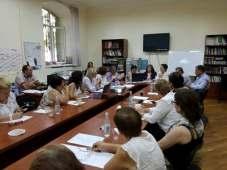
A Taskforce (a Strategy Taskforce) was created representing relevant ministries agencies, local governments, fishfarms, international organizations, CSOs, and experts (Annex RA 1-12). The Strategy Taskforce aimed to discuss and develop a Strategy on participatory, transparent, and accountable water resource management with its implementation of Road Map in the course of a series of sessions. The draft Strategy and Road Map has broadly discussed with target communities, within WPAN, and with the colleagues of another USAID project - Advanced Science & Partnerships for Integrated Resource Development (ASPIRED). After receiving all inputs as a stakeholder consensus-based document, the Strategy (with its Roadmap) was submitted to the Ministry of Environment and the Water Committee of the Ministry of Territorial Administration and Infrastructure.
a Strategy Taskforce: 25 members representing 22 institutions
RA Government Office RA Ministry of Nature Protection (MoNP)1 RA Ministry of Territorial Administration and Development (MTAD)2 RA Ministry of Agriculture (MoA)3 RA Ministry of Health (MoH) RA Ministry of Justice (MoJ) RA State Committee of Water Economy (SCWE)4 National Assembly Standing Committee on Territorial Administration, Local Self-Government, Agriculture and Nature Protection (NA Standing Committee) World Bank, Armenia UNDP EU Water initiative plus project OXFAM FAO PURE Water WPAN American University of Armenia (Master of Laws graduate program (LLM)) AUA Acopian Center for the Environment Vedi community Yeghegnut community USAID ASPIRED project UFSD CWP ELRC, YSU Ecoteam NGO
185 citizens - 146 women, 39 men, and 15 youth participating in Strategy development process
1 Renamed into RA Ministry of Environment since 2019 2 Renamed into RA Ministry of Territorial Administration and Infrastructures since 2019 Government restructuring 3 Included in the RA Ministry of Economy 4 Now, Water Committee under MTAI
The Strategy and Road Map were the main documents the project committed to deliver. However, in the course of the project, after reassessing the decision-makers‟ needs the project helped to draft three additional legal documents: draft laws on Water User Associations5; Environmental Information6; and Environmental Policy7. For the last two drafts, funds were leveraged from UNDP- GEF “Generate global environmental benefits through environmental education and raising awareness of stakeholders” project. The draft laws have been developed in close cooperation and coordination with the RA Ministry of Territorial Administration and Development (MTAI Water Committee and RA NA Standing Committee on TALSGAE.
Strategy Taskforce Meeting

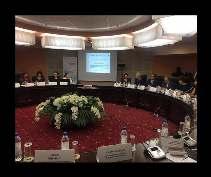
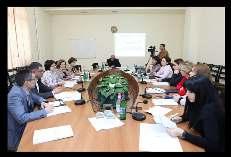

Working discussion at the RA NA Standing Committee
For the purpose of working on the Law on Environmental Policy the NA Standing Committee on TALSGAE established a working group. During the discussions of the structure and the first chapters of the Draft RA Law on Environmental Policy the working group members agreed on the need to involve a more resources for receiving a comprehensive input: local and international experts, policymakers, as well as other relevant public and non-governmental organizations. Mary Galstyan, Deputy Chairperson of the NA Standing Committee, officially requested the USAID PURE Water project Chief of Party (CoP) to help in the involvement of an international expert on environmental policy. The PURE Water project, through USAID Armenia assistance, linked them with the USAID Office of Transition Initiatives (OTI) project which normally provides rapid assistance to the urgent needs of the Government.
1.2. Improve the capacity of citizen groups to effectively advocate for transparent decision making in water resource management and solicit constructive civil society input for improved policy-regulatory environment
Pre-project situation: Base-line study conducted in Ararat Valley at the beginning of the project showed that 55 percent of households were not familiar with their rights and responsibilities as indicated in their agreement for irrigation/drinking water use. During the town hall meetings, conducted in the inception phase of the project half of the problems identified by the target community residents were about better water management and ensuring the rights of water users, which required advocacy efforts.
The process of initiating the development of an Advocacy Strategy by PURE Water revealed that even local activists, local civil society, national CSO on water and environmental issues did not have relevant advocacy skills to voice and pursue handling the water management and rights enforcement issues. PURE Water project base-line study and stakeholder, mapping also demonstrated according to experts the fish-farms and water user associations were among influential stakeholders in water management and use and as big water users were interested in keeping a status-quo in
5 Regulates participatory, transparent, accountable, and efficient water management by WUAs 6 Specifies types of environmental information subject to mandatory publication. This relates also to water sector 7 An umbrella law defining the main principles of environmental policy and relates also to water sector
Ararat Valley. Every 7 respondents thought that the state should enhance control over the use of groundwater resources by fish-farms and only every 4 respondent considered the work of Water User Associations (WUAs) effective.
PURE Water worked in all the aforementioned areas aiming to mitigate the problems and created models to replicate for achieving holistic solutions to the problems.
Achievements
Residents in target communities and civil society are more vigilant and demanding due to intensive advocacy at local and national levels
8,304 water users and other residents (20.7% of the population of target communities) voiced the necessity for water management improvements: Among them, farmers, community active groups, fish-farms, young citizen journalists through petitions, social media and media articles, advocacy actions, awareness events, changes in legislation.
Advocacy at National Level for Transparent Decision Making in Water Resource Management
At the beginning of the PURE Water project, around 30 representatives of CSOs, CWP, local governments, farmers, created a non-formal Water Sector Public Advocacy Network (WPAN) to promote the advocacy for addressing groundwater issues in Ararat Valley. The main target of WPAN was the operation of WUAs, monitoring and control of water usage, irrigation, and drinking water tariffs, and water users' rights. The PURE Water helped the network to develop a Public Advocacy Campaign Strategy (Annex RA 1-3), Advocacy Toolkit (Annex RA 1-14), and Manual on Public Advocacy Campaign, Planning, and Implementation.
A training-of-trainers session on advocacy campaign planning and implementation were conducted for PURE Water project beneficiaries, particularly the members of the WPAN, community working groups (CWPs), and various active residents from the project target communities to gain skills for planning and carrying out advocacy campaigns in their communities.
Advocacy Strategy Brainstorming Meetings and Advocacy ToT for CSOs and CWGs members
. WPAN was instrumental to solicit a constructive CSO input at the national level: Input on the development of Legal Assessment, Strategy, and Road Map. Advocacy of the draft program of improvement of the legal framework for the efficient functioning of WUAs. Input on the development and promotion of the draft law on Water User Associations. Development and promotion of the draft template of the contract between water users and WUAs. Input on the development of draft law on environmental policy. Advocacy for the water rights, participatory environmental assessment, transparent permitting process. Input on the discussions of legislative changes regarding “secondary water use” and “free water use.”
Legal Assessment, Strategy sections, and Road Map: At the inception stage of the project, the Legal Assessment, Strategy sections, and Road Map have been discussed in the WPAN sessions. The WPAN members continued their input on the aforementioned documents as Strategy Taskforce members. Besides, a WPAN member, Armavir Development Center shared the document and evolved a discussion at the Open Government Partnership (OGP) Armenia Working Group meeting.
A draft contract between water users and water user associations: Based on the Advocacy Strategy action plan (Annex RA 1-13), the WPAN initiated the process of making amendments in the draft contract between water users and water user associations. The main concerns were about the terms of the contract and its appendices related to the debts formed and accumulated due to the amounts paid, and the payment options of actual water used by the water user. WPAN drafted the problematic clauses of the contract and organized discussions with the project target communities, council members, active youth, and WUA‟s representatives of Ararat and Armavir regions. Based on the input of stakeholders, a new model structure of the contract with WUAs was prepared. The full version of the draft contract was circulated among all stakeholders including Water Committee and RoA NA Standing Committee for comments and suggestions (Annex RA 1-7).
RA Law on Water User Associations: Under the PURE Water project WPAN coordinated the process of drafting a new edition of the RA Law on Water User Associations. The conceptual basis for the new draft law was a document titled “Draft Program of Improvement of Legal Framework for Efficient Functioning of WUAs” developed by the PURE Water project expert. The document suggested key legal and institutional principles for participatory, transparent, accountable, and efficient water management by WUAs. The draft program was discussed and suggestions were provided by WPAN members.
Discussions on the draft law continued with the World Bank, which was included in the Strategy taskforce formed within the PURE Water project. It had a sound contribution to the establishment and sustainability of WUAs in Armenia. Other international stakeholders Eurasian Fund, French Development Agency, and KfW also joined to discuss several problematic issues and many new approaches on the subject and provided their inputs. Suggestions made were considered in the draft law.
Then WPAN brought the deliberation to a higher-level by inviting all key stakeholders - NA Standing Committee, Water Committee, target local governments, CWP members, CSOs, international organizations, and experts-to the discussion of the draft Program. During the two-day workshop, the issues such as the election of WUA management/governing bodies, management issues, dispute resolution mechanisms, supervision, public monitoring and oversight issues, irrigation water prices and tariffs, as well as the formation and the role of regulatory council of WUAs were discussed.
WPAN-initiated Advocacy Workshop on the Draft Law of WUAs
The workshop participants unanimously agreed that the water sector reform must be implemented. Alternative options for irrigation water management can be used for certain areas, where the integrity of the hydro-unit is allowed and technical and economic feasibility is justified. This should be done together with the Water User Associations‟ recovery
process in order to select the final model/models of irrigation water distribution/supply. Also, there was an agreement on the need for adopting a Concept and a “Law on Irrigation Water,” Law “on Water User Association,” as well as on introducing different pilot models of irrigation water management and supply: by WUAs, commercial organizations, municipalities/inter-municipal unions, state and through public-private SUCCESS STORY: Secondary water use in Political agenda partnerships. The event was covered by Yerkir Media TV Company: Advocacy A legal gap was identified during PURE‟s work with fish farms. A fish farm had workshop on policy and regulatory improvements covered by Yerkir Media re-used the disposed water of another fish farm, yet had been penalized by relevant authorities for using water without having a water use permit. The issue of regulation of reuse and free use of water has been discussed with the (1) representatives of the RA Ministry of Nature Protection, the RA Ministry of Advocacy workshop on policy and Agriculture, RA Mining and Environmental Inspectorate, academic institutions, regulatory improvements covered by USAID ASPIRED Project and ICARE Foundation as well as with fish farms. All stakeholders agree that there is a need to make amendments to the RA Water Yerkir Media (2) Code and relevant Government decisions to fill the legal gap.
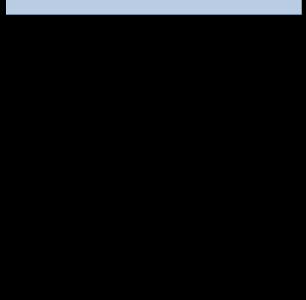
7 members of WPAN, as members of The discussion was continued in the fish farms event where the fish farmers shared their best practices on efficient water use. During the event, there was a the RA NA Standing Committee constructive debate on the topic between fish farmers and the Head of WRMA, Environmental Working Group RA MNP. members, regularly participated in the discussions of RA draft laws on After series of discussions, the Head of WRMA applied to the USAID PURE Water project and asked for a support in joint development of a package of Environmental Information and legislative amendments to the RA Water Code (Article 25.1) and RA Environmental Policy. Government Decision # 128 which marks a good example of behavior change by a decision-maker due to the efforts of PURE Water project. The Project Reuse and free use of water: Another provided a concept and recommendations regarding the amendments, which advocacy action initiated under the particularly related to the procedures of provision of water-use permits, secondary (multiple) and free water uses, as well as to the development forms PURE Water project related to the legal of relevant requests and certificates. gap in the reuse of groundwater. Details are in the success story described in the box (See also under the Result Area 3):
Advocacy through small grants: Under the PURE Water project small advocacy grants scheme, WPAN memberCSOs and experts voiced and promoted the solution to several problems prioritized by the Advocacy Campaign Strategy to contribute to more efficient groundwater management and use (Annex RA 1-9).
Particularly, cases of water rights infringement in Ararat Valley were identified and applications submitted to the Government for the restoration of violated rights; forms to ensure effective public notification was drafted to access to information on the expected water use permits issuance; water users contract clauses were discussed with legal entity water users to come-up with rights and responsibilities which will be equally fair for water users and water user associations; amendments to the Charter of WUAs was drafted to enhance water users participation in decision making process: consultation with water users before decision-making, representation of farmers and local governments in WUAs management bodies, accountability and reporting to water users; an amendment to the procedure on public notice and consultations were drafted and submitted to the RA Ministry of Nature Protection to increase public participation in the process of environmental assessment (Annex RA 1-6).
Local advocacy for efficient water management due to increased capacity of citizen groups
The PURE Water initiated a series of advocacy trainings and seminars for project target communities to improve the capacity of citizen groups to effectively advocate for transparent decision making in water resource management. As a result of trainings, the representatives of advocacy groups gained general knowledge about the concept of advocacy, advocacy, implementation mechanisms, and tools (how to distinguish between "decision-makers" and their influencers, message development, skills for developing petitions, letters), negotiations and lobbying, monitoring and evaluation.
“The Might of the Community”: Local capacity and activism contributed to voicing the groundwater problems and achievement of tangible results Knowledge on water rights: regaining copies of water user contracts for WUAs (Yeghegnut and Yeraskhahun) Petitions to GOAM and NA: The right to drinking water - 1,000 signatures by Aygavan; having a Groundwater preservation day in the national calendar - 2,525 signatures from 7 target communities Self-mobilization on ad-hoc issues: ensuring uninterrupted water supply, water quality, customer rights (Aratashen, Vedi, Pokr Vedi, Khachpar)
Seven target communities of Ararat Valley (Ararat region – Aygavan, Khachpar, Vedi and Pokr Vedi; SUCCESS STORY- Aratashen: MIGHT of the Community Armavir region – Aratashen, Yeghegnut, Yeraskhahun,) developed action plans (Annex RA 1-3) and implemented advocacy initiatives under the “We demanded, followed up, and succeeded”: addressing unstable electricity supply ensured stable water supply umbrella title “The Might of the Community. The The problem of the poor condition of electricity supply in the issues in the aforementioned communities have community of Aratashen became critical. The solution of the issue been advocated with active citizen engagement. became even more urgent as the irrigation season started (the whole community's land is irrigated by the water pumped from Ararat Valley Groundwater Preservation Day: 7 boreholes). Emergency electricity cuts and interrupted supply target community mayors initiated and submitted a caused dissatisfaction among the residents. Call to the Government and National Assembly of After several earlier attempts to draw attention of relevant Armenia, inviting their attention to the acuteness of authorities to the issue, the local advocacy group members asked the groundwater problem in Ararat Valley proposing the Mayor of Aratashen to send again a letter this time to General to add September 30 as the Ararat Valley Manager of “Electric Network of Armenia” Company. The response Groundwater Preservation Day to the calendar of was not delayed: they informed that with the aim to upgrade, key environmental events. The Call reached out to Company ordered the draft design documents which have been more than 25,000 people online. 2,525 residents of already completed and delivered to the Contractor organization for target communities joined the call with their signatures. A roundtable widely covered by media the implementation of the relevant works by the 2019 investment project. highlighted the need for the protection of Construction works were not delayed either. The work on upgrading groundwater resources in Ararat Valley. the poles and replacing cables started soon in the community: “The problem was finally resolved,” said the members of the local Regaining copies of irrigation contracts in advocacy group Zhora, Nonna and Ruzanna. “We demanded, Yeghegnut, Armavir region: Water users of followed up, and succeeded,” they stated. Yeghegnut community did not have their copies of irrigation contracts signed with the Water User Association. After knowing their water rights, with the help of the local advocacy group they decided to demand copies of contracts. The issue was resolved by negotiations with the WUA, without official communication. The WUA representative handed the copies of the irrigation contracts with attachments to the village residents in presence of the advocacy group members. Replacing electricity poles in Aratashen Addressing the drinking water problem of Pokr Vedi community: The broken drinking water pipe of Pokr Vedi, Ararat Region, affected the quality of drinking water. The local advocacy group capacitated under the project mobilized residents to voice the issue and seek a solution. Drinking water samples were taken and sent to the Veolia Jur, the service provided along with the signatures of the community residents. The service provider responded with a promise to put into operation a daily regulation reservoir in the neighboring community that would feed also Pokr Vedi and renovate 2.5 km of a water pipeline to channel water to the community. To date, the water network remains in bad shape. Especially, in summertime emergencies in the drinking
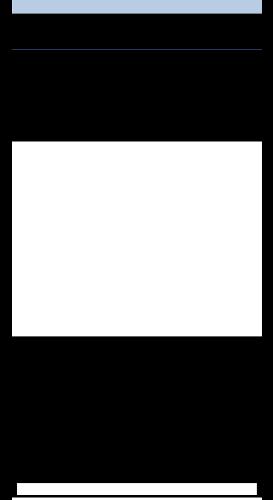
water were becoming more frequent. The local advocacy group helped the residents to call the Veolia Jur 1-85 hotline and receive solutions on ad hoc emergencies.
Drinking water quality issue in Khachpar community, Ararat region: The drinking water in Khachpar community of Ararat region had an unpleasant taste and smell for days. The Khachpar community Advocacy group members alerted “Veolia Jur” company, by calling continuously on the company‟s “1-85” hotline. Two days later, “Veolia Jur” employees arrived in the village and took drinking water samples from different parts of the village. A considerable amount of residual chlorine was found in sampled water, which was the cause of the unpleasant taste and smell. The problem has been resolved.
Drinking water issue of Aygavan community: Access to drinking water is the key problem of Aygavan. Every day residents wait in a long line to collect water in buckets from the only tap available in the community. The issue was debated on TV by Ayagavan municipality, government, and water supplier representatives. An article was published in a reputable investigative electronic media Hetq. The local advocacy group mobilized the community residents to sign a petition. The package of 1,000 signatures from residents of Aygavan community was sent to the RA Prime Minister of RA. The Prime Minister assigned the MTAI, Ararat Regional Governor Office to find solutions. Based on the inquiry of the MTAI Water Committee the service provider, Veolia Jur responded that the drinking water system was obsolete with a large amount of water losses. The conclusive letter of the Water Committee to Aygavan Municipality stated that the issue will be discussed in the framework of upcoming investment programs.
To date, the problem remains unresolved.
Aygavan: this is how the residents usually start their day for many years now. Petition to Prime Minister
1.3.Contribute to the improvement of participatory practices of the state-run Basin Management Organization of the Ararat Valley, promote the involvement of BMOs in raising public awareness of basin management in Ararat Valley
Pre-project situation: Basin Management organizations (BMOs) are acting at the local level and are responsible for water basin management according to the management plans. BMOs as institutions had been supported by USAID earlier, however, they still need to improve their transparency and outreach capacities. In reality, they still remain largely dependent on the RA Ministry of Nature Protection (MNP) whereas conceptually, they meant to be decentralized local bodies for basin management.
As part of the policy dialogue and advocacy, the PURE Water project, within the limits of available project resources, worked with the RA MNP and its WRMA to improve consultation and participation practices at the local level to facilitate civic engagement in decision making with basin management in Ararat Valley. The Ministry reiterated that strengthening BMOs and decentralization of water resource management remained its priority. It also committed to increase public participation and role in water resources management.


